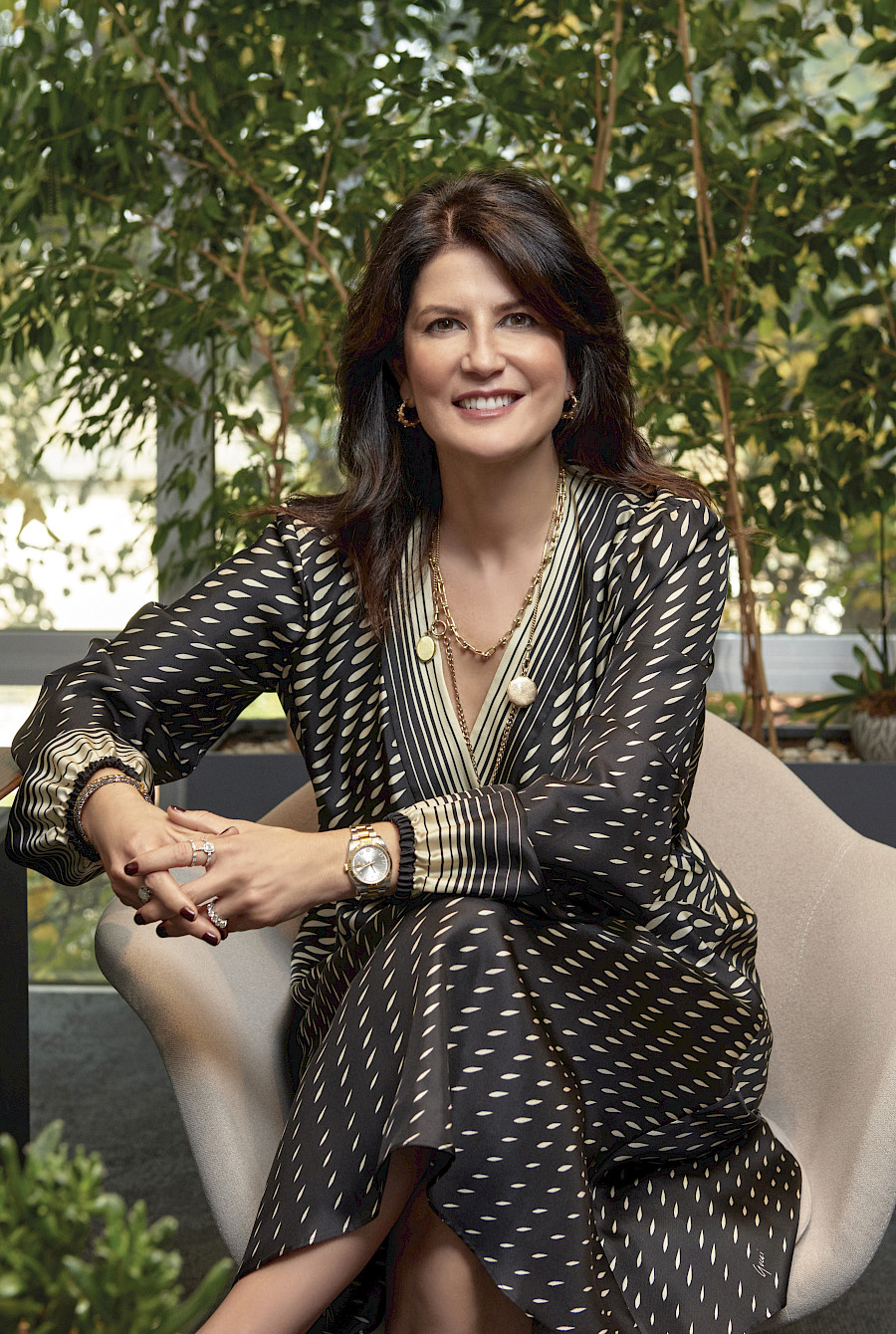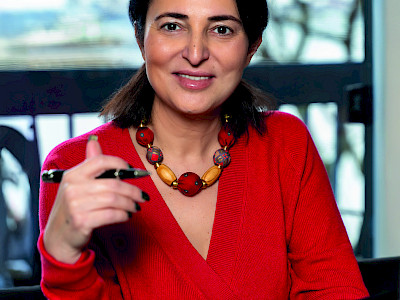
In the dynamic world of payments and technology, Yasemin Bedir stands as a beacon of leadership and innovation. As the President of Mastercard for Eastern Europe, she navigates a complex and ever-changing landscape, fuelled by over two decades of global experience. Yasemin’s journey began with bold ambitions and unwavering determination, propelling her into leadership roles that reshaped the industry and left a lasting impact on financial inclusion and women’s empowerment in technology.
Her story took a groundbreaking turn when she became Mastercard’s first Turkish female senior executive in North America – a milestone that marked not just a personal achievement but a transformative chapter for the company. Yasemin led pivotal projects, driving advancements that set new benchmarks for the industry. Her dedication to empowering women extended beyond her professional role, as she took on the position of Vice Chairman at the Women in Technology Association (WTECH), advocating for gender equality with passion and purpose.
Yasemin’s leadership philosophy is rooted in transparency and a commitment to continuous learning. She believes in paving the way for future generations, creating opportunities that inspire and empower. At Mastercard, her strategic vision merges seamlessly with a focus on people, shaping a more sustainable and inclusive digital economy. Yasemin Bedir isn’t just leading; she’s crafting a legacy that redefines the possibilities of leadership in the digital age.
How are your personal values and life principles reflected in Mastercard’s corporate philosophy?
For me, leadership starts with strong personal values: inclusivity, openness, and the desire to make a lasting positive impact. These principles have shaped my career and align seamlessly with Mastercard’s corporate mission to create a world where everyone has access to priceless possibilities. At Mastercard, we don’t just enable transactions – we drive progress. One area where this is particularly evident is our focus on financial inclusion.
Over the years, Mastercard has committed to bringing one billion people into the digital economy by 2025, a mission that resonates deeply with my belief in creating equal opportunities. I have always believed in building bridges – whether between people, ideas, or markets – and Mastercard’s work to connect communities, small businesses, and underserved populations reflects this value. At Mastercard, our commitment to fostering innovation and inclusion is deeply rooted in everything we do, including our work in Azerbaijan. We’ve actively introduced advanced payment solutions, driving digital transformation and enabling progress within the country’s financial ecosystem. By collaborating with local financial institutions, we’ve spearheaded initiatives such as contactless payment technologies and sustainable card programmes, creating a more accessible, secure, and environmentally friendly financial landscape. One of the partnerships in the social sphere I’m particularly proud of is our collaboration with the Azerbaijan Business Women and SHE Congress in Azerbaijan. This platform is dedicated to advancing women’s leadership and entrepreneurship across the region, and by supporting this initiative, Mastercard is reaffirming its dedication to gender equality. Empowering women to thrive, both professionally and personally, is not just a corporate priority – it’s a passion we wholeheartedly embrace. On a personal level, I believe in the power of continuous learning and embracing challenges. These principles are at the heart of Mastercard’s innovative culture.
In the highly competitive payments industry, what do you believe sets Mastercard apart from other players in the market? Mastercard is not just a payment company; we are a technology-driven, purpose-led organisation. Our strength lies in our ability to innovate and adapt, solving real-world challenges while maintaining trust and security. From AI-powered fraud prevention to tokenisation and digital-first solutions, we lead the way in creating safer, smarter, and more seamless experiences for consumers and businesses. We don’t compete against the ecosystem; we enable it. By partnering with fintechs, banks, startups, and governments, we create tailored solutions that address local needs while contributing to global advancements. In Turkey, for example, we support a dynamic fintech ecosystem, helping new players scale their technologies both domestically and internationally. Our focus on sustainability and social impact is another differentiator. Through initiatives like the Priceless Planet Coalition and programmes supporting small businesses, we demonstrate that innovation and responsibility can go hand in hand. Mastercard’s commitment to sustainability, inclusion, and purpose ensures that we stand apart not just as a leader but as a partner for progress.
As society moves towards a fully cashless payment system, how do you envision the future?
The transition to a cashless society represents one of the most significant shifts of our time, and it comes with incredible opportunities. I envision a future where payments are fully integrated into everyday life – invisible, seamless, and secure. Imagine a world where your wearable device or smart car completes a transaction without any friction, powered by technologies like biometrics, IoT, and AI. But this future must be inclusive. As technology advances, ensuring that everyone – regardless of geography or background – has access to digital tools is critical. At Mastercard, we take an active role in this transformation through financial literacy programmes, partnerships with governments, and solutions that bridge gaps for underserved communities. For example, we work with fintechs to provide prepaid solutions that enable financial access for unbanked populations. I also believe trust will define this cashless future. People need to know that their data, transactions, and identity are secure. Mastercard invests heavily in cybersecurity innovations to protect consumers, ensuring that the digital economy is safe, accessible, and reliable.
How would you summarise Mastercard’s approach to sustainability?
Sustainability is about creating long-term value – for people, businesses, and the planet. At Mastercard, we approach sustainability through three key lenses: environmental impact, financial inclusion, and social responsibility. Our commitment to achieving net-zero emissions by 2040 reflects our dedication to protecting the environment. Programmes like the Priceless Planet Coalition, which aims to restore 100 million trees by 2025, are tangible steps toward this goal. But we also empower individuals to make greener choices. Tools like the Carbon Calculator help consumers track the environmental impact of their purchases, making sustainability a daily practice. On the social side, Mastercard has a strong focus on financial inclusion, aiming to connect one billion people to the digital economy. Supporting small businesses, empowering women entrepreneurs, and driving digital access in underserved markets are core to our mission. Sustainability, for us, isn’t just an initiative – it’s a mindset embedded in everything we do. Our role as a technology leader gives us the unique ability to innovate solutions that benefit both the economy and the environment.
As the Vice Chairman of the Board of the Woman in Technology Association (WTECH), in which areas do you believe the organisation has had the greatest impact on the tech industry?
WTECH is making a real difference by championing the role of women in technology, a field where gender balance remains a global challenge. One of our most impactful initiatives is mentorship. Through programmes like “100 Women Leaders in Technology”, we connect young women with industry leaders, helping them gain skills, confidence, and a clear vision for their future. Education is another critical area. By collaborating with businesses, universities, and institutions, we are equipping women with the technical skills they need to succeed in STEM. I’m proud to see more women entering leadership roles and breaking barriers. By encouraging greater representation, we are strengthening the tech industry with diverse perspectives and new ideas. WTECH’s work creates a ripple effect: when women thrive, businesses and communities benefit as well.



